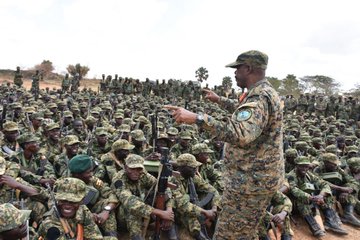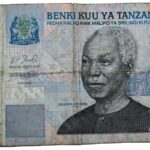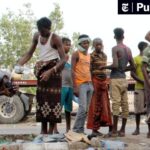KAMPALA, Uganda – Ugandan president Yoweri Museveni has commended Ugandan soldiers deployed to South Sudan for their role in recent joint military operations aimed at quelling insurgent activity in the war-torn Greater Upper Nile region, where government forces reportedly retook control of the strategic town of Nasir.
In remarks delivered Monday, Mr. Museveni praised the Uganda People’s Defence Forces (UPDF) for collaborating with the South Sudanese People’s Defense Forces (SSPDF), saying the two militaries had “worked together effectively” to push back armed groups that had captured territory in the northeastern part of the country.
“This was a successful joint effort to stabilize a region that had been overtaken by negative elements,” Mr. Museveni said, referring to rebel groups believed to have launched cross-border raids and threatened key transport corridors.
The announcement came just hours after a separate incident rocked South Sudan’s fragile peace efforts: a bomb reportedly struck a hospital in an undisclosed location, causing casualties. It was not immediately clear whether the explosion was linked to the ongoing fighting in the Upper Nile region. South Sudanese authorities have yet to comment on the blast.
The town of Nasir, located near the Ethiopian border, has long been contested by insurgent factions. Analysts say its recapture marks a symbolic and tactical victory for South Sudan’s government and its regional allies, but cautioned that security remains precarious across much of the country.
Uganda has frequently deployed troops to neighboring South Sudan, citing historical ties, regional stability, and the protection of trade routes and civilians. The latest intervention underscores Kampala’s continued role as a power broker and security partner in the volatile region.
While Mr. Museveni did not specify the duration or scope of the UPDF deployment, he hinted at further cooperation with Juba, emphasizing the need for African states to support one another in eliminating insurgencies that threaten cross-border peace.
Human rights groups have raised concerns in the past about Ugandan military interventions, citing risks of civilian harm and unclear exit strategies. The UPDF maintains that its presence in South Sudan is guided by mutual defense agreements and conducted in coordination with regional bodies.
The UN Mission in South Sudan (UNMISS) has not yet commented on the joint operations or the bombing incident, but international observers are closely monitoring developments amid fears of renewed instability ahead of South Sudan’s delayed elections.





